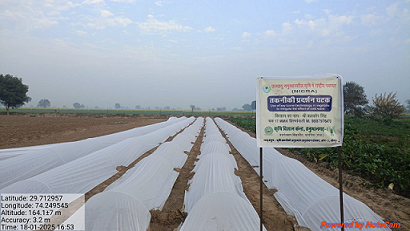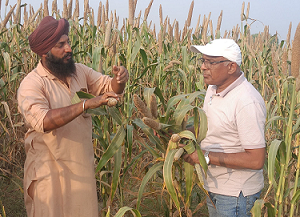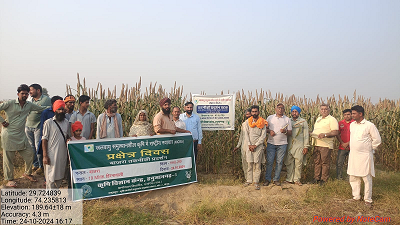NICRA
NICRA at KVKs
Aside from those who rely on these elements for their livelihoods, climate change presents complicated issues such as several biotic and abiotic pressures on cattle, crops, and fisheries enterprises. Extreme weather events have become more frequent in recent years, which has had an impact on farm output and revenue. At the national level, this will also affect the supply of staple food grains. The Indian Council of Agricultural Research (ICAR) launched the National Initiative on Climate Resilient Agriculture (NICRA) in 2011 with the goal of improving Indian agriculture's resistance to climate change and variability through strategic research and technology demonstration. Crop, livestock, fisheries, and natural resource management are all the focus of strategic research on adaptation to the changing climate. Participatory assessment of location-specific solutions in India's disadvantaged areas is the main goal of technology demonstration. Through the management of land, water, crops, and cattle, these elements help farmers deal with climate variability.
As part of NICRA, under Technology Demonstration component, two villages viz., Hirnawali and Chistiyan in Hanumangarh district have been identified with the specific objectives:
1. To demonstrate site specific technology interventions on framers fields for coping climatic variability in vulnerable districts
2. To create awareness and build capacity among farmers and other stakeholders on climate resilient agriculture.
3. To build up innovative institutional mechanisms at village level that enable the farming community to respond to climatic stresses
The technology demonstration programme in selected district is undertaken by Krishi Vigyan Kendra (KVK) Hanumangarh-I. The project sites have been selected by a multi-disciplinary team constituted by each KVK based on degree of climatic vulnerability faced in the village. The Participatory Rural Appraisal (PRA) of the selected villages was undertaken to understand the farming systems, resource situation, constraints and climatic vulnerabilities and to identify opportunities of climatic change adaptation and mitigation of farming communities. Based on detailed analysis, action plan for each selected village was prepared by the multi disciplinary team of scientists on participatory mode. The technological and institutional interventions for enhancing resilience of farming systems to climatic variability have been identified, finalized and implemented on participatory mode. The interventions focus on building resilient agriculture through a series of NRM, cropping, livestock, fisheries and institutional interventions. Priority is given for small, medium land holders and women farmers in selection of beneficiaries. The project activities are being monitored closely by The Director, ATARI Zone-II, Jodhpur.
Various successful technological of KVKs interventions to mitigate climate change have been reported under the following heads. It is hoped that these successful interventions will be useful for further dissemination to enhance the resilience of agriculture to climatic variability.
Various successful technological of KVKs interventions to mitigate climate change have been reported under the following heads. It is hoped that these successful interventions will be useful for further dissemination to enhance the resilience of agriculture to climatic variability.
- Natural Resource Management
- Crop production
- Livestock and fodder production
- Institutional Programme
- Capacity building Programmae
- Extension Activities
KVKs play a key role in NICRA implementation at the district level.









